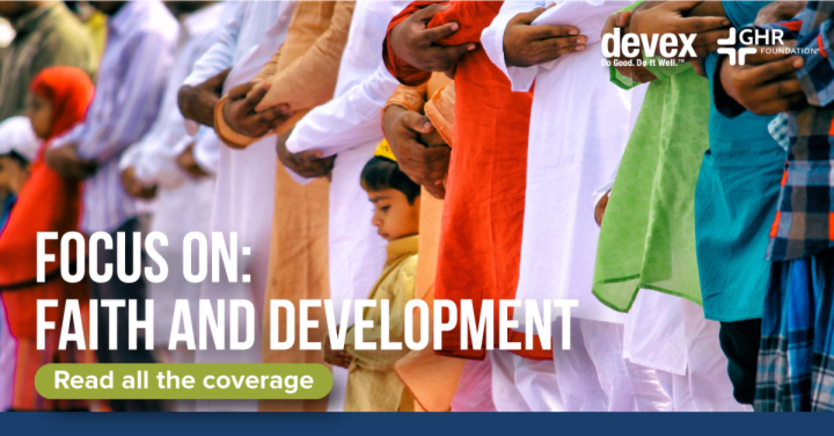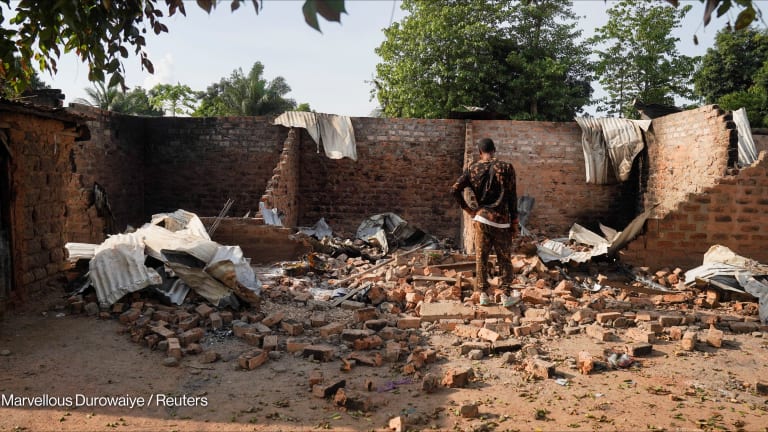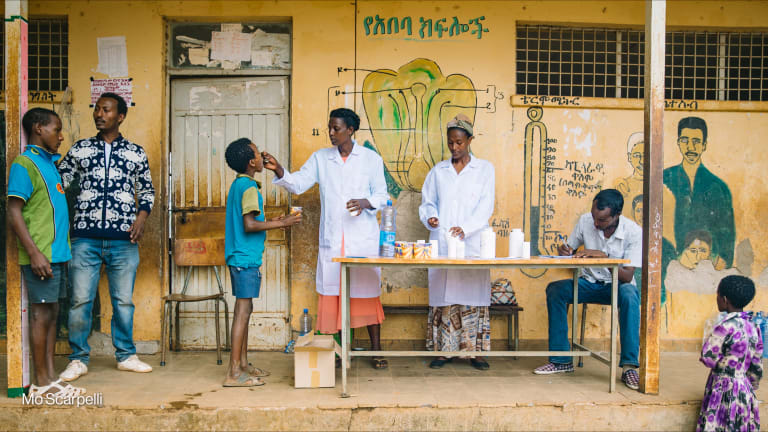
All too often, faith actors or people of religion are seen as the cause of conflict, when they can instead be seen as part of the solution, said Sharon Rosen, global director of religious engagement at peace-building NGO Search for Common Ground.
“I don't know how many times I'm told, when I say I'm working in this field, ‘but there's really a problem, they cause all these wars, they’re behind so many terrorist acts,’” Rosen explained. “But there are billions of people whose religions are dear to them, and they’re not terrorists. They have tremendous influence in their communities and are regarded as people who communities can trust.”
Part of our Focus on: Faith and Development
This series illuminates the role faith actors and their communities play in strengthening global development outcomes.
“They're usually the first responders to issues [and] they have large organizations that support the development of people in communities, whether it's providing food or humanitarian assistance,” she added.
With that in mind, Rosen urged governments and the global development community to more routinely engage religious leaders on “subjects of our time,” including peace building, environmental protection, migration, and poverty eradication.
To help, Search for Common Ground has developed a Common Ground Approach to Religious Engagement toolkit — with grant support from the GHR Foundation. It details the benefits of inclusive and collaborative approaches, how to engage religious actors in peacemaking in a multisectoral way, and the best way to design, monitor, and evaluate religious engagement initiatives.
Speaking to Devex, Rosen outlined some of that guidance and shared some examples of when faith and interfaith engagement have yielded peace building success stories.
This conversation has been edited for length and clarity.
When people come to you for advice on how to engage faith actors, what do you tell them?
First of all, we say that there is an absolute need to collaborate with them. And collaboration means listening to them. I think too often we tell rather than listen. So listen to the needs of people and speak with them in a way that respects their dignity, their understandings, and beliefs, and together, through that cooperation, find issues of common interests so that we can work together.
Secondly, inclusion. That means that we don't just talk to specific religious leaders that might support our political agenda, but we talk to all religious actors, including women — who are often very much at the forefront of community work — and youth — who often speak with a different voice from those senior leaders.
We also say that ... advocacy comes from a place of neutrality. Therefore, we do not come with our own agenda [and] with our own understanding of what needs to be done, but we [instead] listen and we talk to everybody. Inclusion is not just in relation to religious actors. [It] includes governments as well, even if we disagree with them, because in the final analysis, our belief is that the way to really transform norms in society … [is] working together and moving forward. The minute one is aggressive or brings one's own agenda without listening to the other, you come up against a defensive attitude and an inability to change.
Are there any examples or success stories you share to back up these recommendations?
We developed the Universal Code of Contact on Holy Sites, recognizing that safeguarding holy sites is a common interest of all religions and, in many cases, most governments. Yet they’re attacked constantly because people attacking them know that they’re attacking the very deepest identity of the places of the holy sites that serve the people who visit them and who feel very attached to them. It's a way of harming those people.
The code has very practical orders on how to protect holy sites and includes education for the future and access to holy sites — and what to do when holy sites are shared and there's conflict around them. What do you do when they are expropriated and so on? The message behind the code is that only with the collaboration of the relevant authorities can you actually protect holy sites.
Who are the relevant authorities? It's a cooperation of religious actors and not just the religious actor of a particular holy site, but interreligious dialogue and collaboration. It’s the national government, the local government, the police, the laws of justice, the media as well.
In Bosnia and Herzegovina, there was an enormous amount of attacks on holy sites, including cemeteries and others. There was an initiative taken by the Interreligious Council of Bosnia and Herzegovina that when a site was attacked, religious leaders of the different religions — usually Muslim and Christian, but sometimes Jewish — would go to the desecrated site [and] denounce [the attack] together in person. They would call the media up in advance so that they would be there to cover the denunciation of the religious leaders together. Seeing that the media were onto this and that this was something that became news, the police were much quicker about catching the perpetrators; the justice system was quicker in prosecuting them, and the municipalities took it on themselves to repair the sites. As a result, the number of attacks dropped, and we even had an optimal situation where the perpetrators were caught, met with the religious leader of the holy site, and there was a reconciliation there and discussion as to why that happened, and they themselves repaired the site.
“Advocacy comes from a place of neutrality. Therefore, we do not come with our own agenda [and] with our own understanding of what needs to be done, but we [instead] listen and we talk to everybody.”
— Sharon Rosen, global director of religious engagement, Search for Common GroundWhat can you tell us about the toolkit that Search for Common Ground was able to produce on this topic?
The GHR Foundation gave us the flexibility and the space to research and develop materials that have now been created into a toolkit, which includes a facilitator manual, a participant workbook, and a set of PowerPoint presentations. It was originally created for our staff, and the purpose was to get the staff on the same wavelength in relation to how to work with religious actors, but also to provide a place for them to bring in their own needs, have their own discussions and their own ways of developing projects.
The materials are full of case studies of different ways of using the material and how we have worked with religious actors from places where we have not directly worked with them because we have found it to be too sensitive. In Myanmar, where we have an office — although unfortunately since January we have not been able to work as we would like — there was a decision that we would focus on drama programs. … We partnered with the main TV station [and] radio stations in order to provide a different way of looking at the actors — one Muslim, one Buddhist, and so on — so that there would be an opportunity for people to get to know each other on the television, not focusing directly on religious leaders.
In addition to that, as a result of these resources, GHR enabled us to partner with the United States Institute of Peace to create an online course on an introduction to religious engagement through a common ground approach. That course was launched in July of this year, and it's at the moment being translated into Arabic and French and those will be launched at the end of November.
Devex, with support from our partner GHR Foundation, is exploring the intersection between faith and development. Visit the Focus on: Faith and Development page for more. Disclaimer: The views in this article do not necessarily represent the views of GHR Foundation.









